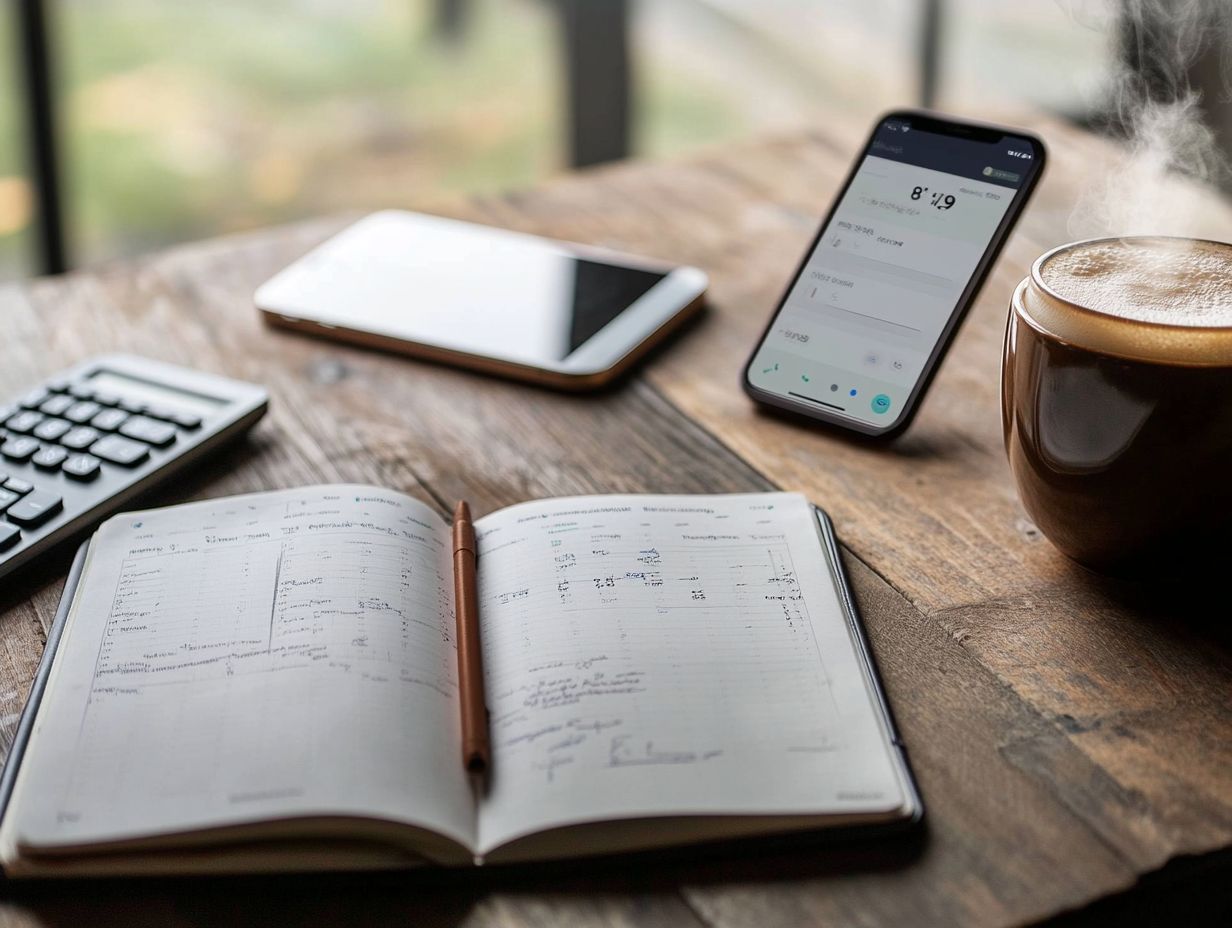5 Tips for Sticking to Your Monthly Budget
Sticking to a monthly budget may seem challenging. But with the right strategies, it becomes manageable, especially when you use effective budgeting tips.
Here are five essential tips to help you set realistic goals, track your expenses, and cut costs without sacrificing your quality of life.
You ll also learn about common challenges, ways to stay motivated, and the long-term benefits of budgeting, like improved personal finances.
Ready to transform your finances? Let s dive into these actionable tips!
Contents
- Key Takeaways:
- 1. Set Realistic Goals and Priorities
- 2. Track Your Expenses Regularly
- 3. Find Ways to Cut Costs
- 4. Plan for Unexpected Expenses
- 5. Reward Yourself for Sticking to Your Budget
- Why Is Sticking to a Budget Important?
- Got Questions? We’ve Got Answers!
- What are the 5 tips for sticking to your monthly budget?
- How can setting realistic financial goals help with sticking to a monthly budget?
- Why is tracking expenses important for sticking to a monthly budget?
- What should be included in a budget plan for sticking to a monthly budget?
- How can I avoid impulsive purchases and stay within my monthly budget?
- How do I stay motivated to stick to my monthly budget?
Key Takeaways:

- Set realistic goals and priorities to align your budget with your financial objectives.
- Regularly track your expenses to find areas to cut costs.
- Plan for unexpected expenses to avoid going over budget.
1. Set Realistic Goals and Priorities
Setting realistic goals is the foundation of effective budgeting. It helps you align your spending with your long-term aspirations for better financial health.
Start by identifying your financial goals. Categorize them into short-term (like saving for a vacation) and long-term (like planning for retirement).
Prioritize these goals to ensure your immediate needs don t overshadow your future aspirations. Using the SMART criteria specific, measurable, achievable, relevant, and time-bound can enhance your goal-setting process.
Partnering with a friend to hold each other accountable can keep you committed. Together, you can track progress and celebrate achievements!
2. Track Your Expenses Regularly
Tracking your expenses is crucial for managing your money effectively. It gives you insights into your spending habits and helps you stay on budget.
You can use budgeting apps like EveryDollar or traditional spreadsheets for better visibility of your financial standing. Understanding fixed expenses (like rent) versus variable expenses (like dining out) is key.
Monitoring your expenses promotes accountability and encourages proactive planning. This makes it easier to save for emergencies and boosts your confidence in managing finances.
3. Find Ways to Cut Costs
Finding ways to cut costs is essential for sticking to your budget. Start by distinguishing between necessary and discretionary spending.
Meal planning can greatly reduce your grocery bills and minimize food waste. Stick to a shopping list to avoid impulse purchases.
Evaluate recurring expenses like subscriptions to reveal potential savings. By adopting these 5 creative ways to cut monthly expenses, you can work towards financial stability and build healthier money habits.
4. Plan for Unexpected Expenses

Planning for unexpected expenses is essential to your budgeting. It helps you handle financial emergencies and maintain your financial health without derailing your goals.
An emergency fund acts as your savings, offering peace of mind. When surprises happen like car repairs or unexpected medical bills you’ll have a safety net ready.
Allocate a portion of your monthly income to this fund. Even a small percentage can add up over time!
If you set aside just 10% of your paycheck each month, you’ll build a solid fund for those unforeseen costs. This will help you avoid relying on credit cards or loans, preserving your long-term stability.
5. Reward Yourself for Sticking to Your Budget
Rewarding yourself for sticking to your budget enhances your financial discipline. It motivates you to stick to your spending plan and fosters a positive relationship with your finances.
Set aside a small portion of your budget for treats! Whether it’s a favorite snack or a movie night, these little joys make your savings journey enjoyable.
Implementing a rewards system encourages you to stay committed to your financial goals. Celebrate your achievements, no matter how small, to ignite your motivation.
Why Is Sticking to a Budget Important?
Sticking to a budget is crucial for your financial health and personal goals. It promotes accountability and encourages disciplined spending and saving behaviors.
A budget helps reduce financial stress as you gain clearer insights into your income and expenses. This structured approach leads to increased savings and provides a cushion against unexpected costs.
Following a budget opens doors to better investment possibilities. You can strategically allocate resources toward growth-oriented ventures.
- The envelope method
- Zero-based budgeting
- The 50/30/20 rule
These methods make tracking your spending easier. They help you cultivate a secure financial future while nurturing sustainable habits.
What Are the Common Challenges in Sticking to a Budget?
Challenges in adhering to a budget often stem from impulsive spending and unexpected expenses. Identifying these obstacles is key to enhancing your financial discipline.
Social pressures can complicate matters. Friends or family may inadvertently influence your spending behaviors.
Set clear spending limits for discretionary expenses. This creates safeguards to help you maintain your goals.
Consider bringing in accountability partners, like a friend or financial advisor, to reinforce positive habits.
How Can One Stay Motivated to Stick to Their Budget?

Staying motivated to stick to your budget is essential. Reinforcing your financial goals and using strategies that promote accountability can help.
Visualizing your financial aspirations can be a powerful motivator. It allows you to picture your success and the rewards that come from sticking to your budget. Celebrating small victories along the way, like making it through a week without overspending, builds your confidence and reinforces the habits that lead to bigger achievements in budgeting.
Engaging with an accountability partner can transform this journey into a more enjoyable experience, providing you with encouragement and constructive feedback. Tracking your progress with budgeting apps or journals can reveal valuable patterns and highlight your improvements. Additionally, utilizing 5 tips for budgeting for retirement can ultimately boost your motivation to reach even greater financial milestones.
What Are Some Helpful Budgeting Tools and Apps?
Utilizing effective budgeting tools and apps can truly simplify your budgeting process. This makes it easier for you to track expenses, set financial goals, and maintain control over your personal finances.
For instance, consider an app like EveryDollar. Its user-friendly interface allows you to create customized budgets quickly and track your progress with ease. This app emphasizes simplicity, enabling you to plan for monthly expenses while keeping a watchful eye on your savings goals. You might also explore 5 apps that help you stay on budget for more options.
If you re looking for something with a bit more depth, Mint might be worth your time. It offers detailed information into spending patterns and even helps with bill tracking.
When selecting the right app for your needs, take a moment to reflect on your financial habits and objectives. Consider whether you prefer the hands-on approach of manual entry or the convenience of automated syncing with your bank accounts. Additionally, incorporating 5 must-know budgeting tips for new graduates can significantly enhance your budgeting experience.
How Can One Adjust Their Budget If Needed?
Adjusting your budget as necessary is a crucial component of financial planning. It enables you to stay agile in the face of changing circumstances while keeping your financial goals in sight.
This adjustment process often arises from typical factors like income fluctuations be it job changes or unexpected layoffs and unforeseen expenses that can pop up from medical emergencies, car repairs, or home maintenance needs.
To navigate these adjustments effectively, start by reviewing your current budget to pinpoint fixed and variable expenses. Then, outline your income sources to assess any changes in your financial inflow. Following that, prioritize essential spending to ensure that your necessities like housing, food, and healthcare are adequately covered. You can also explore 5 essential tips for college budgeting to enhance your financial planning.
Think about reallocating funds from non-essential categories within your budget, and make it a habit to continually monitor your financial situation by following seasonal budgeting tips for families so you can make further adjustments as needed.
What Are the Long-Term Benefits of Sticking to a Budget?
The long-term benefits of adhering to a budget are nothing short of transformative. You’ll experience enhanced financial health, increased savings, and the opportunity to achieve significant milestones like homeownership or retirement.
Effective budgeting is your ticket to a secure financial future! It serves as the foundation for building an emergency fund, creating a safety net for those unexpected twists life throws your way. To enhance your budgeting skills, consider exploring 5 strategies for budgeting with a side hustle. This proactive mindset shields you from surprise expenses while cultivating a sense of financial stability.
As you master the art of budgeting, you re likely to see your credit score improve. With responsible debt management and timely payments, you enable yourself for future borrowing needs.
Armed with a comprehensive understanding of your finances, you can plan more effectively for your aspirations. Whether it’s funding your child’s education, embarking on global adventures, or retiring early, a well-structured budget turns your dreams into achievable goals. Incorporating budgeting methods like zero-based budgeting and adopting 5 daily budgeting habits can also help in making your financial planning more effective.
Got Questions? We’ve Got Answers!

What are the 5 tips for sticking to your monthly budget?
The 5 tips for sticking to your monthly budget are setting realistic financial goals, tracking your expenses, creating a budget plan, avoiding unplanned purchases, and staying motivated.
How can setting realistic financial goals help with sticking to a monthly budget?
Setting realistic financial goals can help you stick to your monthly budget by giving you a clear purpose. This clarity makes it easier to resist unnecessary expenses and stay focused on long-term financial aspirations. It also helps in setting personal financial goals.
Why is tracking expenses important for sticking to a monthly budget?
Tracking expenses is crucial because it helps you identify where your money is going. Knowing this allows you to determine where you may need to cut back and make budget adjustments if necessary.
What should be included in a budget plan for sticking to a monthly budget?
A budget plan should include all sources of income, regular bills (such as rent or utilities), changing costs (like groceries or entertainment), and a designated amount for savings deposits or debt repayment.
How can I avoid impulsive purchases and stay within my monthly budget?
To avoid unplanned purchases and stay within your monthly budget, try using cash instead of credit cards. Make a list before shopping, and give yourself a cooling-off period before making any purchase.
How do I stay motivated to stick to my monthly budget?
You can stay motivated by regularly reviewing your financial goals. Reward yourself for staying on track and remind yourself of the long-term benefits of budgeting. Seeking support from friends or family, or having an accountability partner, can also help keep you motivated.






